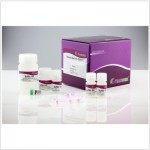Product Category:
Human Adenovirus Type5 (dE1/E3) expressing Tumor Protein P53 (P53) under a CMV promoter.
Description:
Tumor Protein P53 (Li-Fraumeni Syndrome), pre-made adenovirus, ready to ship and ready to use format.
Gene Name:
Tumor Protein P53 (Li-Fraumeni Syndrome)
ACCN:
NM_000546
Gene ID:
7157
GI Number:
8400737
Fusion Tag:
No
Promoter:
CMV
Titer:
1x1010~1x1011 PFU/ml
Storage Buffer:
DMEM with 2.5% BSA, 2.5% glycerol
Background:
The tumor suppressor protein, p53, is a sequence specific transcription factor that is activated by cellular stress. p53 mediates cell cycle arrest or apoptosis in response to DNA damage or starvation for pyrimidine nucleotides. p53 is up-regulated in response to stress signals and stimulated to activate transcription of specific genes, resulting in expression of p21waf1 and other proteins involved in G1 or G2/M arrest. The structure of p53 comprises an N-terminal transactivation domain, a central DNA-binding domain, an oligomerisation domain, and a C-terminal regulatory domain. There are various phosphorylation sites on p53, of which the phosphorylation at Ser15 is important for p53 activation and stabilization. p53 has been characterized to play a role in blocking the proliferative action of damaged cells and act as an anticancer agent. Phosphorylation of Ser392 in p53 has been shown to associate with the formation of human tumors. In addition, p53 has also been linked to the effects of aging and oxidative stress and an increase in p53 has been linked to deficits in LTP (Long Term Potentiation) in learning and memory. p53 is found in very low levels in normal cells, however, in a variety of transformed cell lines, it is expressed in high amounts, and believed to contribute to transformation and malignancy. Mutants of p53 that frequently occur in a number of different human cancers fail to bind the consensus DNA binding site, and cause the loss of tumor suppressor activity. Alterations of the TP53 gene occur not only as somatic mutations in human malignancies, but also as germline mutations in some cancer-prone families such as Li-Fraumeni syndrome.
Documents:

